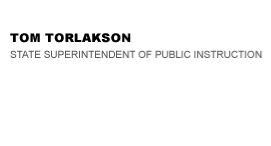September 11, 2017 ESSA Update #9 Letter


Official Letter
Official Letter
Dear County and District Superintendents and Charter School Administrators:
EVERY STUDENT SUCCEEDS ACT – Update #9
The purpose of this letter is to update you on California’s transition to the Every Student Succeeds Act (ESSA). Included in this letter is a reminder regarding paraprofessional requirements under the ESSA, an update regarding the Equitable Services Ombudsman, and information regarding schoolwide program requirements.
Paraprofessional Requirements Under the Every Student Succeeds Act
Under the ESSA, teachers and paraprofessionals are to be assigned based on state licensure and certification criteria. California Education Code Section 45330 provides the following:
- As used in this section, a paraprofessional means a person who assists classroom teachers and other certificated personnel in instructing reading, writing, and mathematics. A paraprofessional includes an instructional aide as defined in subdivision (a) of Section 45343 and a teacher aide as described in Section 45360.
- A paraprofessional shall perform only duties that, in the judgment of the certificated personnel to whom the instructional aide is assigned, may be performed by a person not licensed as a classroom teacher. These duties shall not include assignment of grades to pupils.
- Pursuant to the federal No Child Left Behind Act of 2001 (P.L. 107-110), a local education agency that receives funding from Title I of that act shall ensure that every paraprofessional hired on or after January 8, 2002, who is supported by those Title I funds and who assists in instruction has demonstrated at least one of the following in addition to any other requirements under that act:
- Completion of at least two years of study at an institution of higher education.
- Possession of an associate’s degree or higher.
- Through a local or state assessment, that is appropriate to the responsibilities to be assigned to the paraprofessional, knowledge of, and ability to assist in, instructing reading, writing, and mathematics.
- Except as provided in subdivision (h), a paraprofessional hired prior to January 8, 2002, who is supported by federal funds from Title I of the federal No Child Left Behind Act of 2001 (P.L. 107-110) shall meet the requirements of subdivision (c) no later than January 8, 2006.
- No person shall be initially assigned to assist in instruction as a paraprofessional in kindergarten and grades 1 to 12, inclusive, unless the person has demonstrated proficiency in reading, writing, and mathematics skills up to or exceeding that required by the employing district for high school seniors pursuant to subdivisions (a) and (f) of Section 51220 if the employing district educates high school pupils.
- If the employing district is an elementary school district, the paraprofessional shall demonstrate proficiency in reading, writing, and mathematics skills up to or exceeding that required for high school seniors pursuant to subdivisions (a) and (f) of Section 51220 in the high school district that includes all or the largest portion of the elementary district.
- In establishing the educational qualifications or in developing a proficiency exam, a school district shall align the qualifications and proficiency exams pursuant to paragraph (3) of subdivision (c).
- A paraprofessional who is supported by federal funds from Title I of the federal No Child Left Behind Act of 2001 (P.L. 107-110) and who meets either of the following conditions is exempt from the requirements described in paragraphs (1) to (3), inclusive, of subdivision (c):
- The paraprofessional is proficient in English and a language other than English and provides services primarily to enhance participation of pupils by acting as a translator.
- The paraprofessional’s duties consist solely of conducting parental involvement activities.
- A paraprofessional who was hired on or before January 1, 2003, and who has previously demonstrated, through a local assessment, knowledge of, and an ability to assist in, instructing reading, writing, and mathematics, is deemed to have met the proficiency exam requirements of paragraph (3) of subdivision (c).
- A school district may use an existing proficiency assessment or may develop a new proficiency assessment to meet the requirements of paragraph (3) of subdivision (c).
- Pursuant to the federal No Child Left Behind Act of 2001 (P.L. 107-110), a local education agency may use a portion of the funds from that act for staff development for paraprofessionals, to the extent that those funds are appropriated in the annual Budget Act for this purpose.
Therefore, paraprofessionals working in a program supported with Title I funds must have a secondary school diploma, or its recognized equivalent, and possess at least one of the following qualifications:
- They have completed at least two years of study at an institution of higher education,
- They have obtained an associate’s or higher degree, or
- They have met a rigorous standard of quality and can demonstrate, through a formal local academic assessment, knowledge of and the ability to assist in instructing reading, writing, and mathematics (or readiness in those subjects, as appropriate). It is up to the local school district as to whether they will accept an out of state exam.
Paraprofessionals working outside Title I funded programs must have a secondary school diploma, or its recognized equivalent, and have met a rigorous standard of quality and can demonstrate, through a formal state or local academic assessment, knowledge of and the ability to assist in instructing reading, writing, and mathematics (or readiness in those subjects, as appropriate). It is up to the local school district as to whether they will accept an out of state exam.
These requirements are publicly available on the California Department of Education (CDE) Improving Teacher & Principal Quality Web page.
If you have any questions pertaining to this subject, please contact the Educator Excellence Office by phone at 916-445-7331 or by e-mail at educatorexcellence@cde.ca.gov.
Equitable Services Ombudsman
To help ensure equity for private school children, teachers, and other educational personnel, the State educational agency has designated Education Programs Consultant Sylvia Hanna as the Equitable Services Ombudsman to monitor and enforce the requirements of the Elementary and Secondary Education Act (ESEA) as amended by the ESSA Section 1117 - Participation of Children Enrolled in Private Schools, and Section 8501 - Participation by Private School Children and Teachers (under Uniform Provisions Subpart 1, Private Schools), as of July 2017.
The Equitable Services Ombudsman’s new Web page provides the purpose of the Ombudsman and available resources pursuant to Title I, Part A and Title VIII. It can be viewed at http://www.cde.ca.gov/sp/sw/t1/ombudsmaneqservices.asp.
In addition, the Equitable Services Ombudsman Frequently Asked Questions (FAQs) are intended to help local educational agencies (LEAs) and other stakeholders understand the statutory requirements for statewide equitable services for eligible students attending nonprofit private elementary and secondary schools under Title I, Part A of the ESEA, as amended by the ESSA. The new Equitable Services Ombudsman FAQs are available at http://www.cde.ca.gov/sp/sw/t1/ombudsmanfaq.asp.
If you have questions regarding Equitable Services, please contact Sylvia Hanna, Education Programs Consultant, Improvement & Accountability Division, by phone at 916-319-0948 or by e-mail at Shanna@cde.ca.gov.
Schoolwide Program
Under ESSA Section 1114, LEAs with schools below 40 percent poverty may operate a schoolwide program (SWP) if the local governing board approves the waiver based on the school meeting one or more of the following criteria:
- ≥25 percent student low income
- Graduation rate is below state average
- Local governing board recommends that a SWP is the best way to serve the student population
- ≥30 percent English learner student population
- School has been identified for comprehensive or targeted support
- School has been identified as one of the lowest performing 5 percent of schools
Once the local governing board approves the waiver request, the school must then complete the following:
- Conduct a Comprehensive Needs Assessment
- Develop a SWP Plan
- Obtain local governing board approval of the SWP Plan and begin operating as a SWP on the day the local governing board approved the SWP Plan
In addition, the LEA must report its approval of the school’s SWP waiver by completing the Notification of Authorization of Schoolwide Program report in the Winter Release of the Consolidated Application Reporting System (CARS). The LEA must indicate the dates the local governing board approved the SWP Waiver and SWP Plan.
If you have questions regarding the Schoolwide Program, please contact Lana Zhou, Education Research and Evaluation Consultant, Improvement & Accountability Division, by phone at 916-319-0956 or by e-mail at lzhou@cde.ca.gov.
The CDE is committed to providing schools and districts, stakeholders, and members of the public clear and timely communication regarding our state’s transition to ESSA. You can find more information and resources, including programmatic and fiscal guidance from the U.S. Department of Education, on the CDE ESSA Web page. I encourage you to join the CDE ESSA listserv to receive e-mail notifications when new information becomes available. To join, please send a blank e-mail message to join-essa@mlist.cde.ca.gov.
If you have any questions regarding this letter, please contact the program contacts listed within or the CDE ESSA Office by phone at 916-319-0843 or by e-mail at ESSA@cde.ca.gov.
Sincerely,
/s/
Tom Torlakson
TT:bm
